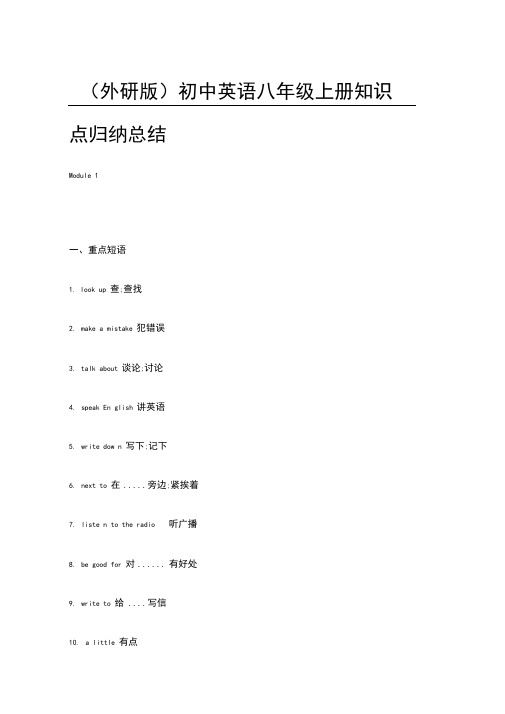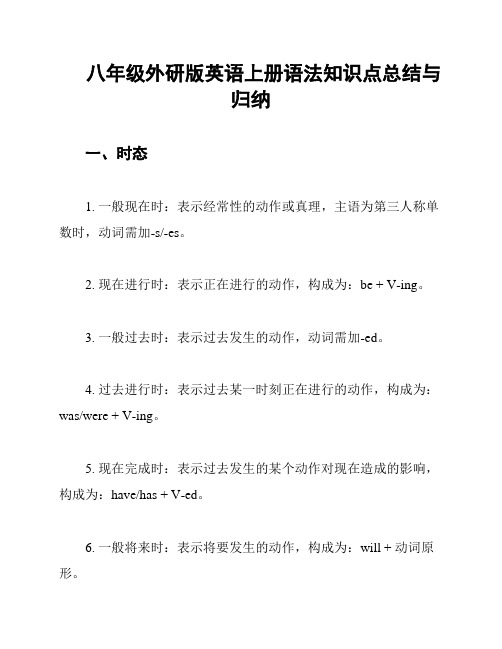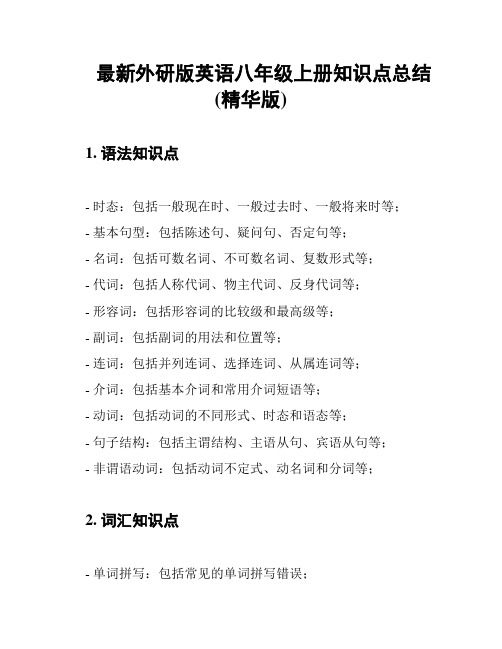外研社英语八年级上知识点整理
(外研版)初中英语八年级上册知识点归纳总结

(外研版)初中英语八年级上册知识点归纳总结Module 1一、重点短语1.look up 查;查找2.make a mistake 犯错误3.talk about 谈论;讨论4.speak En glish 讲英语5.write dow n 写下;记下6.next to 在..... 旁边;紧挨着7.liste n to the radio 听广播8.be good for 对...... 有好处9.write to 给 .... 写信10. a little 有点12. talk to 跟……交谈11.agree with sb. 同意某人13.send sth. to sb. 把某物(发)送给某人14.ask for 请求15.watch films 看电影16.be from 来自17.smile at 冲 .... 微笑18.go to bed 去睡觉19.get up 起床20.thi nk about 考虑21.make frie nds with sb. 与某人交朋友22.take sb. around sp. 带领某人参观某地23. a few 几个;一些24.i nvite sb. to 邀请某人到....25.be good at 擅长26.for example 例如、重点句型1.advise sb to do sth 建议某人做某事2.be afraid to... 害怕做.....3.be good for... 对...... 有好处的4.be (a) great way(s) to do sth 做......... 的(一种)好方法5.It is n atural to do sth. 做某事是合乎常情的。
三、重点语法1.Why not...? = Why don ' t + you (we / they...)...?意为“为什么不……呢?”,后接动词原形。
【外研版】八上英语知识点归纳总结

【外研版】八年级(上册)英语:知识点归纳总结Module1How to learn English1.advice(1)意思是“意见,建议”,为不可数名词,可用some,much,a piece of,pieces of等修饰,不能说an advice或many/a few advices。
(2)表示“有关……的建议”时,用介词on,接名词、代词或由疑问词引导的不定式。
e.g.Let's ask for his advice on what to do next.常见搭配:take/follow one's advice接受某人的建议ask for advice征求意见拓展:advise vt.建议常见搭配:advise sb.to do sth.e.g.My teacher advises me to leave now.老师建议我现在就离开。
2.Each time you will learn something new.I also advise you to talk about the films or songs with your friends.每次你将会学习一些新东西。
我也建议你和朋友们谈论电影或歌曲。
time的用法:(1)time指“时间”用作不可数名词,前面可much,little,a lot of,plenty of等修饰。
(2)当作“次数;倍数”讲时,time是可数名词。
e.g.I have been to Beijing three times.(3)time构成的短语:at a time一次,每一次at one time曾经,一度at times/from time to time有时,偶尔all the time总是,一直in time及时,迟早on time准时(4)time构成的句型:①It's time for sb.to do sth./It's(high)time sb.did sth.该是某人干……的时间了。
初二上英语外研版知识点归纳总结

初二上英语外研版知识点归纳总结英语外研版是我们初中英语教材的一种,旨在帮助学生提高英语听、说、读、写的综合运用能力。
下面是初二上英语外研版的知识点归纳总结。
一、语法知识点1. 时态和语态:学习一般现在时、一般过去时、一般将来时、现在进行时、过去进行时等的用法,以及被动语态的构成和用法。
2. 名词:了解普通名词、专有名词、可数名词、不可数名词等的基本用法,以及名词的复数形式和所有格的构成。
3. 代词:熟悉人称代词、物主代词、反身代词、指示代词等的用法和形式。
4. 冠词:理解定冠词、不定冠词和零冠词的区别和用法。
5. 形容词和副词:学习形容词和副词的用法、比较级和最高级的构成方式,并能正确运用。
6. 数词:掌握基数词和序数词的用法,以及它们在句中的位置。
7. 介词:了解常见的介词及其用法,如in、on、at、by等。
8. 连词:熟悉并能正确使用并列连词、选择连词、原因连词、结果连词等。
9. 从句:了解主从复合句的构成和用法,包括宾语从句和定语从句等。
二、词汇知识点1. 日常生活词汇:掌握与学生日常生活密切相关的词汇,如身体部位、学科、家庭成员等。
2. 动词短语:学习常用的动词短语,如get up、go on holiday、take care等。
3. 学科词汇:了解和掌握与英语学科相关的词汇,如book、notebook、dictionary等。
4. 食物词汇:熟悉和运用与食物相关的词汇,如fruit、vegetable、meat等。
5. 动物词汇:学习各种动物的名称,如elephant、panda、tiger等。
三、阅读技巧1. 短文阅读:熟悉短文的结构,能快速获取信息和理解文章的主旨。
2. 阅读策略:掌握一些有效的阅读理解策略,如扫读、略读、细读等。
3. 理解词义:通过上下文来推断词义,提高词汇理解和运用能力。
四、听力技巧1. 日常交际:提高听懂常用的日常交际语言,如问候、道歉、提问、回答等。
2. 短对话和长对话:理解并提取对话中的关键信息,回答问题或完成任务。
八年级外研版英语上册语法知识点总结与归纳

八年级外研版英语上册语法知识点总结与归纳一、时态1. 一般现在时:表示经常性的动作或真理,主语为第三人称单数时,动词需加-s/-es。
2. 现在进行时:表示正在进行的动作,构成为:be + V-ing。
3. 一般过去时:表示过去发生的动作,动词需加-ed。
4. 过去进行时:表示过去某一时刻正在进行的动作,构成为:was/were + V-ing。
5. 现在完成时:表示过去发生的某个动作对现在造成的影响,构成为:have/has + V-ed。
6. 一般将来时:表示将要发生的动作,构成为:will + 动词原形。
7. 现在完成进行时:表示过去开始进行的动作一直持续到现在,并可能持续下去。
构成为:have/has been + V-ing。
二、被动语态1. 被动语态的构成为“be + 过去分词”,被动语态的主语通常是动作的承受者。
2. 被动语态的时态和语态都可以通过助动词“be”加以表示。
三、情态动词1. 情态动词共有9个:can, could, may, might, must, shall, should, will, would。
2. 情态动词用于表示说话人的态度、感情或是某种推测,通常搭配动词原形使用。
四、关系代词1. who/whom:指人,作主语用who,作宾语或补语用whom。
2. whose:指人或物,表示所有关系。
3. that:指人或物,作主语、宾语、表语、定语等,引导限制性定语从句。
4. which:指物,作主语、宾语、表语、定语等,引导非限制性定语从句。
五、虚拟语气1. 虚拟语气用于表示现在或将来的假设情况或与过去相反的情况。
2. “if”引导的虚拟条件句中,主句通常要使用情态动词;与过去相反的虚拟语气要使用“were”。
六、倒装句1. 完全倒装:将助动词或情态动词提到主语前,用于表示强调或出乎意料的语气。
2. 部分倒装:将助动词、情态动词、系动词等提到主语前,用于表示疑问、否定、祝愿等语气。
外研社英语8年级上册

外研社英语八年级上册知识点总结一、重点词汇解析1.almost /ˈɔːlməʊst/:几乎,差不多。
-例句:It's almost time to go.(差不多该走了。
)-辨析:nearly 和almost 意思相近,但almost 语气更强,在表示“接近”“快要”时,两者可以通用。
2.bored /bɔːd/:厌烦的,厌倦的。
-例句:I'm bored with this book.(我对这本书感到厌烦。
)-辨析:boring 表示“令人厌烦的”,修饰物;bored 表示“感到厌烦的”,修饰人。
3.lonely /ˈləʊnli/:孤独的,寂寞的。
-例句:She lives alone and feels lonely.(她一个人生活,感到很孤独。
)-辨析:alone 表示“独自的”,强调客观状态;lonely 表示“孤独的”,强调主观感受。
4.excellent /ˈeksələnt/:优秀的,极好的。
-例句:She is an excellent teacher.(她是一位优秀的老师。
)-构词法:excel(突出,擅长)+lent(形容词后缀)。
5.population /ˌpɒpjuˈleɪʃn/:人口。
-例句:The population of the city is increasing.(这个城市的人口在增加。
)-用法:表示“某地的人口”时,常用“the population of + 地点”;询问人口数量时,用“What's the population of...?”。
二、重点短语1.quite a few:相当多,不少。
-例句:There are quite a few people in the park.(公园里有相当多的人。
)2.of course:当然,自然。
-例句:—Can I borrow your pen? —Of course.(—我能借你的笔吗?—当然可以。
最新外研版英语八年级上册知识点总结(精华版)

最新外研版英语八年级上册知识点总结
(精华版)
1. 语法知识点
- 时态:包括一般现在时、一般过去时、一般将来时等;
- 基本句型:包括陈述句、疑问句、否定句等;
- 名词:包括可数名词、不可数名词、复数形式等;
- 代词:包括人称代词、物主代词、反身代词等;
- 形容词:包括形容词的比较级和最高级等;
- 副词:包括副词的用法和位置等;
- 连词:包括并列连词、选择连词、从属连词等;
- 介词:包括基本介词和常用介词短语等;
- 动词:包括动词的不同形式、时态和语态等;
- 句子结构:包括主谓结构、主语从句、宾语从句等;
- 非谓语动词:包括动词不定式、动名词和分词等;
2. 词汇知识点
- 单词拼写:包括常见的单词拼写错误;
- 同义词:包括一些常见的同义词辨析;
- 常用短语:包括日常交际中常用的短语;
- 常用惯用语:包括一些惯用语的正确使用;
3. 阅读技巧
- 阅读理解:包括快速阅读和细节理解;
- 阅读速度:包括提高阅读速度和理解能力的方法;
- 阅读技巧:包括推测词义、寻找关键词等技巧;
4. 写作技巧
- 书信写作:包括格式、语言表达和常用句型等;
- 日记写作:包括表达个人感受和经历的方法;
- 作文写作:包括如何组织思路和提高写作水平的方法;
以上是最新外研版英语八年级上册的知识点总结,希望对你的研究有所帮助。
外研版八年级英语上知识点汇总
外研版八年级英语上知识点汇总外研版八年级英语上册知识点总结欢迎来到外研版八年级英语上册的学习之旅。
在这篇文章中,我们将为大家详细介绍本册书中的重要知识点,帮助大家巩固和拓展大家的英语技能。
一、词汇与语法1、词汇(1) 基础词汇:这部分包括了常用的英语单词,如am、is、are、was、were等。
(2) 拓展词汇:通过学习课文和练习,您将接触到更多高级词汇,如yesterday、last night、tomorrow等。
2、语法(1) 现在进行时:这个时态用于描述正在发生的动作,结构为be动词+动词的现在分词,例如We are studying、She is playing tennis。
(2) 一般过去时:这个时态用于描述过去发生的动作,结构为be动词的过去式+动词的过去分词,例如We studied、She played tennis。
(3) 时间表达:本册书将教会您如何用英语正确表达时间,包括时间的顺序、时刻等。
二、课文与对话1、主题本册书的主题是关于时间和活动的,涉及到的场景包括日常生活、学校生活、家庭生活等。
2、课文解析(1) 第一单元:时间管理——讲述如何合理安排时间,提高学习效率。
(2) 第二单元:家庭生活——介绍家庭成员的日常生活和活动。
(3) 第三单元:学校生活——探讨学校中的各种活动和学科。
3、对话示例在每个单元的对话部分,您将听到关于主题的情景对话,通过模仿和练习,提高自己的口语表达能力。
三、实践与应用1、听:通过听录音和听力练习,提高听力理解能力。
2、说:通过模仿对话、角色扮演等活动,提高口语表达能力。
3、读:通过阅读课文和扩展阅读,提高阅读理解能力。
4、写:通过完成写作任务,如日记、书信等,提高写作能力。
四、回顾与展望通过学习外研版八年级英语上册,大家将掌握更多的英语词汇和语法知识,了解如何在不同的场景中运用英语进行交流。
大家还将通过丰富的实践活动,提高听、说、读、写等各方面的英语技能。
八年级上册英语外研版知识点
八年级上册英语外研版知识点一、重点短语1. how far 距离多远2. take the bus 乘公共汽车3. get to school 到校4. spend time 花时间5. go to the zoo 去动物园6. the more,the better 越多越好7. come true 实现8. have a good time 玩得开心9. look like 看起来像10. be ready 准备好了11. would like to do sth 想要做某事12. as a result 结果13. too…to 太……而不能14. on the one hand 在一方面15. be/get ready for 对……做好准备16. in the middle of 在……中间17. make/let sb do sth 让某人做某事18. on the weekend 在周末19. be able to 能够20. be afraid of 害怕21. have a good/bad day 过得开心/糟糕22. be careful 当心,小心23. be covered with 被……覆盖24. be famous for 因……而著名25. be full of 充满……的26. feel/seem/look+adj 看起来……27. in the sky/on the ground 在天上/在地上28. in the future 在将来29. in the sun 在阳光下30. be sure to do sth 确定做某事31. of course 当然了32. on fire 着火33. be late for迟到34. on time准时35. go shopping去购物36. be different from与……不同37. be similar to与……相似38. have a picnic野炊39. much too太……40. instead代替;反而,却41. none一点儿也没有,毫无42. all day整天,一整天,一整天;整日,终日。
外研版英语八年级上册所有知识点总结
• 15.all the time 一直
Module1——重点句型
• 一、提建议的句子: • 1.You(We) should do sth • 2.Let’s do sth • 3.Why not do sth • 4.Why don’t you(we) do sth • 5.How(What) about doing
• …for …有什么用
• 4. arrive at 到达(后接小地点) • 15. take…out of… 从…拿
• 5. once or twice 偶尔,一两次
出…
• 6. go off (灯)熄灭,(闹钟)响起 • 16. go across the road=
• 7.remember to do sth 记得去做某事
• 8. in the east of 在……的东部 • 9.be famous for=be known for • 因……而闻名 • 10.such as 比如 • lions of 数百万的 • 12.on the coast 在海滨,在海岸 • 13.be popular for 因…而受欢
• 7. on one’s way to…
• cross the road 过马路
• 在某人去…的路上
• 17. see/watch/hear sb do sth
• 8. run after 追逐,追赶
看见/听见某人做过某事
• 9. stop doing sth 停止做某事 • see/watch/hear sb doing sth • 看见/听见某人正在做某事
Module 8 重点词组
• 1. in time 及时 • 2. fall off… 从…跌落 • 3. pay attention 注意 • 4. pay attention to doing sth
外研八年级上知识总结
外研八年级上知识总结一、重要短语1. more and more 越来越多2. in the future 在未来3. do shopping 购物4. at the weekend 在周末5. get up 起床6. do homework 做作业7. go to bed 上床睡觉8. go to the cinema 去看电影9. on the/a weekend 在周末10. in a week 在一周内二、重点句型1. It will be + 形容词 + in + 时间段 + 表示未来某个时间点之前会发生的情况。
2. What will you do + 时间点?你将在什么时候做什么?3. How will you go to + 地点?你将如何去某地?4. Let’s + 动词原形 + 表示建议或提议。
5. What are you doing + 时间点?你正在做什么?6. When are you going + 动词不定式?你打算什么时候做某事?7. How long will it take you to do sth?做某事需要多长时间?8. It takes sb some time to do sth某人花费一些时间做某事。
9. I’m sorry to hear that听到这个消息我很难过。
10. I hope to do sth我希望做某事。
三、语法重点1. 将来时态的构成和用法。
2. 宾语从句的用法,包括连接词和语序。
3. 情态动词的用法,包括can、may、must等。
4. 现在完成时的用法,包括have/has been和have/has done的区别。
5. 形容词的比较级和最高级的用法。
6. 反身代词的用法,包括强调主语和表示强调等。
- 1、下载文档前请自行甄别文档内容的完整性,平台不提供额外的编辑、内容补充、找答案等附加服务。
- 2、"仅部分预览"的文档,不可在线预览部分如存在完整性等问题,可反馈申请退款(可完整预览的文档不适用该条件!)。
- 3、如文档侵犯您的权益,请联系客服反馈,我们会尽快为您处理(人工客服工作时间:9:00-18:30)。
Module7 A famous story Unit1 Alice was sitting with her sister by the river. 1. a girl called Alice 2. sit by the river a table of four by the window 靠窗的四人座的桌子 3. a white rabbit with pink eyes a lovely girl with big eyes 4. run past/by (后可接宾语) 5. follow sb./sth. (1) go after …跟着某人 A man is following / going after her. (2) 听从;遵循规则、章程 follow one ’s advice/school rules (3)理解 Don ’t speak quickly, or I can ’t follow you. fell -fallen 跌倒 fall down/into the hole 掉到洞里 fall down from …= fall off …从某地跌倒 昨天她从自行车上跌下来。
She fell down from / fell off the bike yesterday. Look !The fall ing leaves are like butterflies. The ground is covered with fall en leaves. feel- felt-felt 感觉,感到;摸起来 7.注意区分介词 in 和on 1)There is a huge hole in the ground. 2)There is a dog lying on the ground. 3)Please put up the clock on the wall. 4)There are four big windows in the wall of the classroom.教室的墙上有四扇大窗。
5)There are plenty of apples on the tree. 6)My kite is high in the tree. Can you help me 8. smile at sb. 朝某人微笑 laugh at sb. 嘲笑某人 at/in =get to= reach 后接地点 不接地点的时候用arrive They were fighting when we arrived. 10. have/go to a tea party at a party/meeting 11. play a strange game strange= unusual stranger n. ’s Adventures in Wonderland 《爱丽丝梦游奇境》 take/have adventures 去冒险 adventure stories 冒险故事 character [ˈk ær əkt ə(r)] n. 角色 the Mad Hatter 疯帽匠 the March Hare 三月兔 the White Rabbit the Cheshire Cat 柴郡猫 the Queen of Hearts 红桃王后 13. if “如果”,引导条件状语从句(主将从现) “是否”,引导宾语从句(陈述句语序) 1) 如果明天不下雨,我去逛街。
If it doesn ’t rain, I ’ll go shopping. = I ’ll go shopping if it isn ’t rainy tomorrow. 2) 我想知道今天你是否上班迟到了。
I want to know if you were late for work today. 14. do an interview 做一个采访 15. a place where rabbits live 一个兔子居住的地方 Unit 2 She was thinking about her cat. 1. get tired/bored/excited/frightened(害怕的) nothing to do 3. once or twice 偶尔;不时的 sooner or later 迟早 If you don ’t listen to me, you ’ll regret sooner or later.如果你不听我的,迟早会后悔。
4. look into 往…里看;浏览;调查 The government promised to look into the matter. 5. what… for =why What do you study hard for = Why do you study hard 6. a book without pictures or conversations Without air or water, men can ’t live on Earth. = Men can ’t live on Earth without air or water. 7. think of sb./sth.想念某人或某物 think of/about doing sth. think hard 使劲想 think it over 仔细考虑Think twice before you leap.三思而后行。
8. nothing strange 没什么奇怪的事情 someone famous 名人 somewhere warm 暖和的地方 (形容词修饰不定代词,位置放后面) 今天的报纸没什么新内容。
There is nothing new in today’s newspaper. 9.区分hear/see sb. do sth. 听到或看到某人做了某事全过程或经常做某事 hear /see sb. doing sth. 听到或看到某人正在做某事 类似的动词还有feel/ watch / look at / listen to/notice/find 1) 我经常听到小鸟在树上唱歌。
I often hear little birds sing in the tree. 2) 我爷爷经常看我弹琴。
My grandpa often watches me play the piano. 3) 昨天当我到家时,我看见妈妈在用萝卜喂兔子。
When I got home yesterday, I saw my mum feeding the rabbit with a carrot.4) She heard some kids ______ (sing) when she returned to the school. (singing)5) I saw his wallet _____ (fall) onto the ground. (fall)thought it was strange.(否定句)She didn’t think it was strange.(否定前移)我认为他是不对的。
I don’t think he is right.11. take sth. out of / from… 从…拿出…He took some coins out of/from his pocket quickly. 他快速地从口袋掏出几个硬币。
up 起床;起身13. run across thefield/square/river/road/streetrun through the forest/city/gate/hole注意across 横穿;穿过平面 go across=crossthrough穿过一个空间run after=chase追赶她正追着那个男人横过马路。
She is running across the road after the man. 一只鸟追着一只蜜蜂从窗子飞出去了。
A bird flew through the window after the bee.15. go down a hole16.It was too dark for her to see anything.太黑了….什么都看不见结构: too +形、副(for sb.) + to do sth. =… enough to do sth.= so/such…that…(句子用否定形式)对动物来说,这水太脏了不能喝。
The water is too dirty for animals to drink=The water is so dirty that animals can’t drink it.这问题对我来说太难回答。
This question is too difficult for me to answer. This question is so difficult that I can’t answer it.这件外套对他来说太大不能穿。
This coat is too large for him to wear.= This coat is so large that he can’t wear it. It is such a large coat that he can’t wear it.17. She never thought about how she was going to get out again.how 引导的句子作宾语从句时,用陈述句结构。
如:我不知道他在哪里。
I don’t know where he is.转换成 She never thought about how to get out again. how+动词不定式做about的宾语18. think about 考虑(thought- thought)think of 想起,认为 What do you think of…think over 仔细考虑 think it over 考虑再三19. land n. vi.The elephant is the largest land animal.=The elephant is the largest animal on land.The plane landed safely at last.land on some dry leaves 落在一些干树叶上用She opened the door with the key.He bought himself a suit with his pocket money.21. go off (灯) 熄灭22. call sb. up = ring sb. (up)= telephone/phone/call sb.= give sb. a ring/ phone 给某人打电话23. when和 while的区分延续性动词和瞬间动词:延续性动词指一个可以持续一段时间的动作,比如:work, study, swim, walk, run, wait, stay, sleep 等。
